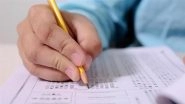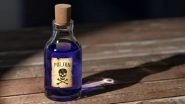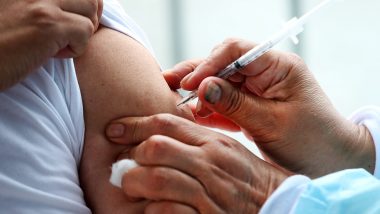California, March 13: According to a new meta-analysis of the association, between sleep duration and the body's reaction to vaccination, how well a vaccine protects you may rely on obtaining enough sleep in the days before and after immunisation. According to the study, sleeping less than six hours each night around the time of vaccination was related with a significant drop in antibody response. How To Fall Asleep Fast? From Reading Before Bed to Listening to Music, 7 Tips To Help You Sleep Better at Night.
The findings of the multi-institution study published in Current Biology. Adults are typically recommended to get between seven and nine hours of sleep per night. The meta-analysis included data on the association between sleep duration and antibody responses for the influenza and hepatitis vaccines. While comparable data on COVID-19 vaccination were not available, researchers said their study highlighted the need to identify simple behavioral interventions, such as sufficient sleep, that could improve the response to COVID-19 vaccination amid the ongoing pandemic.
The weakened antibody response in those with shortened sleep was so profound, it was similar to the decline in COVID-19 antibodies two months following vaccination with the Pfizer-BioNTech or Moderna shots."We have previously found that cognitive behavioral therapy, as well as mindfulness, robustly improve insomnia and also normalize various aspects of immunity, although it is not yet known whether insomnia treatment can augment vaccination responses," said Michael Irwin, MD, a study co-author and director of the Cousins Center for Psychoneuroimmunology at the Jane and Terry Semel Institute for Neuroscience and Human Behavior at UCLA. Heart Disease Patients Are More Prone to Insomnia: Study.
The researchers also examined the data by sex, since women typically have a stronger vaccination response than men. There was a robust association between sleep duration and antibody response in men, but they said more data are needed for women because the studies did not control for variations in sex hormone levels, which are known to affect immune function.
Large-scale studies are also needed to determine when people should get sufficient sleep to promote an optimal vaccine response around the time of inoculation, the researchers said.
(The above story is verified and authored by ANI staff, ANI is South Asia's leading multimedia news agency with over 100 bureaus in India, South Asia and across the globe. ANI brings the latest news on Politics and Current Affairs in India & around the World, Sports, Health, Fitness, Entertainment, & News. The views appearing in the above post do not reflect the opinions of LatestLY)













 Quickly
Quickly


